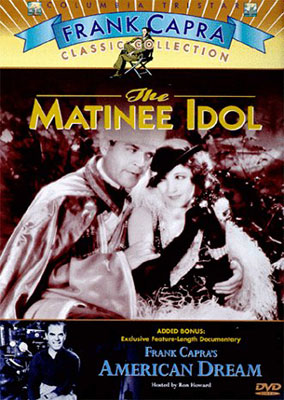
Reviews of silent film releases on home video.
Copyright © 1999-2025 by Carl Bennett
and the Silent Era Company.
All Rights Reserved. |
|
The
Matinee Idol
(1928)
|
In 1928, Frank Capra began working as a director at Columbia Pictures after an early career with Hal Roach Studios and comedian Harry Langdon. Roach wasn’t a high-budget operation, but Columbia was still known in the late 1920s as a ‘poverty row’ studio, cranking out low-budget product a notch below Universal Pictures, the low-budget leader. Over the next seven years, Frank Capra — more than anyone else at the studio — raised the studio’s profile and prestige through a series of well-made comedies and dramas.
Capra’s early Columbia comedy is of a Broadway star who needs a vacation. He then stumbles onto a travelling troupe of actors that are so bad they are hilarious. Our hero is drawn into performing with the troupe and subsequently falls in love with the troupe’s female lead, Bessie Love. The Broadway star’s producer convinces the troupe to appear in New York on Broadway — unknown to them — as a comedy act. The troupe of ham actors are crestfallen when they are laughed at by Broadway audiences. Bessie’s disillusionment leads to bitterness toward our hero. Do they work things out? What do you think?
As a silent era comedy The Matinee Idol is a charming and funny little film.
— Carl Bennett
|
 Columbia TriStar Home Video Columbia TriStar Home Video
1999 DVD edition
The Matinee Idol (1928), black & white, 56 minutes, not rated, with Frank Capra’s American Dream (1997), color and black & white, 109 minutes, not rated.
Columbia TriStar Home Video, 03303, UPC 0-43396-03303-0.
One dual-sided, single-layered, Region 1 NTSC DVD disc; 1.33:1 aspect ratio picture in full-frame 4:3 (720 x 480 pixels) interlaced scan image encoded in SDR MPEG-2 format at 7.0 Mbps average video bit rate (capable of progressive scan upscaling to ? fps); Dolby Digital (AC3) 2.0 stereo sound encoded at 192 Kbps audio bit rate; English language intertitles, no subtitles; 20 chapter stops; standard DVD keepcase; $27.95.
Release date: 15 June 1999.
Country of origin: USA
Ratings (1-10): video: 9 / audio: 8 / additional content: 7 / overall: 9.
|

The restoration of The Matinee Idol is chronicled in the insert to this DVD edition: The Matinee Idol was considered a lost film until it was discovered in the film holdings of La Cinémathèque française. The source print, a 28mm diacetate positive, was determined to have been cut by approximately 10 minutes. Several shots had been shortened, two others were missing altogether. Many frames were missing in the process of trimming fades (presumably to shorten the running time) and in the insertion of French intertitles. Utilizing the original continuity for the film, the English language intertitles were restored in the original font, and minor editing was done to conform the film as closely as possible to the American release version. The resulting video transfer was approximately five minutes shorter than the original domestic version, accounted for in the loss of fades, small trims and shorter intertitle durations. Once the film was structurally restored, Sony set about to repair the photographic elements.
A handful of technical issues brought the restoration team into the digital world. An interpositive print was scanned to creative a 1125-line high-definition video master. Once transferred, automated visual software and manual digital retouching restoration techniques had to be worked out on an experimental basis. Dust, scratches and abrasions were removed both by automated software and by frame-by-frame manual retouching of the digital source. In some shots emulsion damage was so severe that backgrounds were lost at the edges of the frame. Original production stills were scanned and used to replace missing set background detail. In some cases, defects were allowed to remain if the repair artifacts stood out more than the print damage. The goal of the digital team was to return the photographic quality of the film as close as possible to its original state, without introducing modern intrusions such as perceptible digital artifacts, improvements over the original photographic quality (repairing negative or original print flaws or film grain), or outright revisions to the original images. The video master was completed, with the addition of a stereo soundtrack, and imaged back to a new 35mm film positive master by a line-doubled 2250-line high-definition film recorder. The results are nothing short of spectacular.
Such techniques will be used in the future to restore and preserve our motion picture treasures. Digital preservation of nitrate-based films will be the preservation modus of the future. From high-definition masters new 35mm prints can be struck that faithfully represent the original source material, with no loss of picture detail or quality.
The DVD also includes the documentary Frank Capra’s American Dream, first aired on American Movie Classics. The documentary gives us a peek at the career of a great filmmaker, and features interviews and comments from an impressive line-up of Capra crew members, and Hollywood stars and directors.
As a piece of film history, the survival of The Matinee Idol represents an important component of the Frank Capra film legacy. As film preservation, it represents dedication and integrity of the highest order. We highly recommend this DVD, and we congratulate Sony Pictures for a job well done.
|
This Region 1 NTSC DVD edition has been discontinued
and is . . .
|

|
|
|
Other silent era FRANK CAPRA films available on home video.
|
|
Frank Capra filmography in The Progressive Silent Film List
|
|




































